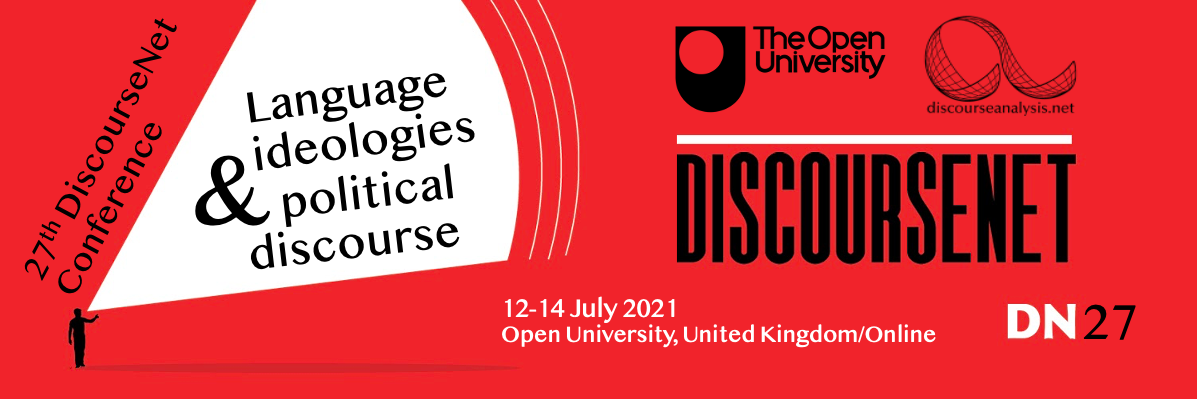Milton Keynes
Royaume-Uni

Home | Pre-Recorded Talks | Live Discussion Schedule | Registration
Welcome to DN27, a virtual conference on language ideologies and political discourse. You can now watch over 30 pre-recorded talks asynchronously and join our live discussions on 12, 13 and 14 July 2021.
To watch pre-recorded talks click here
Conference Theme
Ideologies regarding the social value of languages and discourses are contested, especially in times of political polarisation. Whether it be political rhetoric valorising certain languages over others in social media messages of populist leaders, activism promoting the revitalisation of minoritised languages or the hegemony of colonial languages in academic publishing, we can observe how language ideologies are constructed, and how they permeate every public domain. With this conference, we aim to explore the intersections between language ideology and political discourse, understanding both notions in their broadest terms, and to find tactical solutions to prevent a language ideological meltdown of political discourse; i.e. a politicisation of essential understandings of language as belonging to specific people and not to others. The conference thus aims to open up a critical space in which we can explore ideological discourses that make the indexical links between language and politics meaningful, aiming, ultimately, to reposition ourselves and our research within the very same political discourse that we investigate.
Invited Speakers
- Nishaant Choksi, Indian Institute of Technology, Gandhinagar, India
- Kara Fleming, KIMEP University, Kazakhstan
- Korina Giaxoglou, The Open University, United Kingdom
- Kristina Hultgren, The Open University, United Kingdom
- Isabelle Léglise, Centre National de la Recherche Scientifique, France
- Mie Hiramoto, National University of Singapore
- Adriana Patiño-Santos, University of Southampton, United Kingdom
- Santiago Sanchez Moreano, The Open University, United Kingdom
- Quentin Williams, University of the Western Cape, South Africa
Thematic Panels
- Counter-hegemonic discourses
- Populism
- Non-standard varieties
- English as a neoliberal language
- Political discourse online
- Education
- Minoritising languages
- Political discourse
Format
DN27 will be held as a virtual conference. However, we do not want to simply emulate an offline conferencing experience, so we have decided to experiment with alternative formats. We hope that our ideas will facilitate discussion and interaction among you and help you engage with each other’s work in mutually productive and non-hierarchical ways.
Pre-recorded presentations by 1 June 2021
In order to give you more control over the way you want to present your work, and to accommodate participants from all time-zones, we invite all presenters to pre-record their presentations and upload them to our virtual platform by 1 June 2021. We will assign each presentation to a thematic panel of four and publish them on our website in mid-June 2021, one month ahead of the conference. In this way, all participants will be able to view all pre-recorded presentations in a time convenient to them.
During the conference on 12, 13 and 14 July 2021
During the conference days, we meet to discuss your presentations. We will invite each presenter to become a respondent to another presentation and deliver a five-minute commentary on your colleague’s work. We will then open up a question-and-answer session with all panel audiences. Invited speakers and other scholars will act as discussants for each panel.
Fees and DN membership
The conference itself is free of costs. However, to register for DN27, you must be a fee-paying member of the DiscourseNet Association. The annual membership fee is 30€. Please click on the Registration tab above for details on how to become a member and register for DN27.
Organisers
Johannes Angermuller, The Open University, United Kingdom
Michael Kranert, University of Southampton, United Kingdom
Md Shajedur Rahman, The Open University, United Kingdom
Jaspal Naveel Singh, The University of Hong Kong, HKSAR China
You can contact us via email: dn27@discourseanalysis.net
Scientific Committee
Benno Herzog, Universitat de Valencia, Spain (DIPE)
Aurora Fargonara, Università degli Studi di Milano Statale, Italy
Kaushalya Perera, University of Colombo, Sri Lanka
Jens Maesse, Justus-Liebig-Universität Giessen, Germany (DIPE)
Constanze Tress, Université du Luxembourg
____